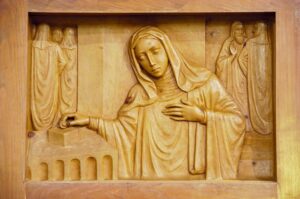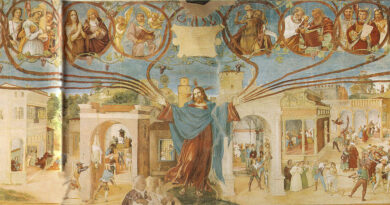Thirty-Second Sunday of Ordinary Time/B
Massimo Palombella

In today’s Gospel (Mk 12, 38-44) Jesus speaks to his disciples about the widow who threw two coins into the Temple treasury, saying that “she threw more than anyone else… She threw everything she had, everything she had to live on”. If we are honest, the story of the widow involves us deeply. In fact, sooner or later life puts us in the condition in which we too have to “throw everything we have to live with”. Situations where all our ‘back-up plans’ run out, where all our studied defensive techniques to keep away what we fear are in an instant cancelled out and we find ourselves, providentially, having to face reality, to live – finally – in reality.
“To ‘throw everything we have to live with’ is to touch the essence of our lives, our greatest strength together with our greatest weakness and our greatest fears. It is exactly like falling in love and taking the step of getting married. It is becoming capable of living “beyond” mathematical certainties, “beyond” the usual “common sense”, “beyond” that deceptive “wisdom” that never lets us risk, imperceptibly condemning us to a life without horizons, without taste and without quality.
Becoming capable of “throwing away everything we have to live with” makes us free, essential persons, capable of change, of starting again, of being truly in touch with ourselves.
The Lord is waiting for us without anything, without those two coins that represent all our false securities and which we find so hard to “throw away”. The Lord is waiting for us “beyond”, even “beyond” our well-being, our achieved and conquered balance, our credibility, our prestige. He is waiting for us “beyond” all this which, if we are not careful, can turn into the most subtle temptation not to change, into the silent deception of believing in a God who does not exist after all, being nothing more than our own poor invention.
The Alleluia Verse (in Gregorian chant, in the fourth mode) of today’s celebration is taken from Psalm 147 (Ps 147:3) with the following text:
Alleluia.
Qui posuit fines tuos pacem et adipe frumenti satiat te.
Alleluia.
He has established peace in your boundaries, and he fills you with the finest wheat.
The attached music, in Gregorian Chant, is taken from the Gradual Triplex published in Solesmes in 1979. Interpretation: ‘Le Chœur des Moines de l’Abbaye bénédictine de Saint-Benoît-du-Lac’ conducted by Dom André Saint-Cyr. The musical track can be found on the CD “Pax: Gregorian chant on the theme of peace” published by Analekta in 2010.
A blessed Sunday and heartfelt greetings.


